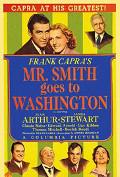
Directed by
Frank Capra
129 minutes
Rated G
Reviewed by
Bernard Hemingway

Mr Smith Goes To Washington
Frank Capra's populist style made a lot more sense when it was made than it does today. Even if its sense of decency and commitment to democratic values are laudable, post-Vietnam, post-Watergate, post-everything, even as nostalgia this story about a wide-eyed country boy (James Stewart, aged 31!) taking on big business and winning is asking a lot of a modern day audience.
Reminiscent of Capra's earlier film, Mr. Deeds Goes To Town (1936), this is a David and Goliath story at its most dewy-eyed (and not bested until Forrest Gump, 1984, although that film had to make its hero mentally-challenged), James Stewart was again teamed with his co-star Jean Arthur from the previous year's Best Picture Oscar winner, also directed by Capra, You Can't Take It With You,1938. Whilst this kind of role was Stewart's stock-in-trade he provides a welcome leavening to his character's gee-shucks naiveté, the establishing and reinforcing of which takes up the first half of the film
Whether you take the film in its historical context as a chastening exhortation to good governance (it created controversy in its day because of its depiction of corruption in Washington) and a celebration of positive values or dismiss it as dated propaganda (Dimitri Tiomkin's medley of flag-waving Americana songs being a case in point) for a now well-tarnished ideology is a matter of choice. The film received eleven Academy Award nominations but its sole award went to Lewis R. Foster for his original story - a novel titled 'The Gentleman from Montana'.
FYI: In 1940, Stewart was awarded the Best Actor Oscar for The Philadelphia Story (1940), often considered a consolation prize for his loss in this year.
Want something different?





